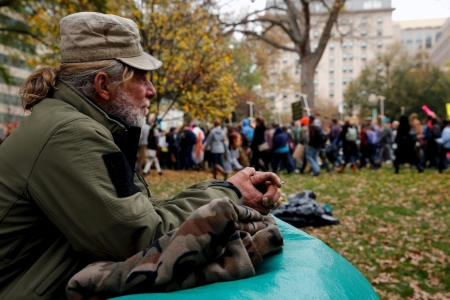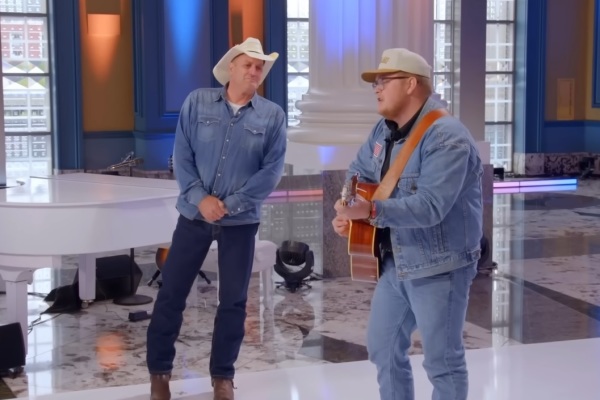Homeless man now feeds hundreds a day: Finding our empowering purpose through service

Anthony Delgado lived on the streets of Atlanta, Georgia, panhandling to feed his drug addiction. One day, a man and woman told him he should go to the VA hospital. No one around him saw the couple, however. He started panhandling again but developed chest pain. A man stopped to help and gave him a token for a train ride to the hospital. When Delgado stepped onto the train, the man had vanished.
Delgado made it to the hospital, joined a rehab program, and got help from a pastor. He told the minister the story of the vanishing couple and the man who gave him the train token, and the pastor replied, “Believe it or not, there are angels.”
Delgado got a job and then, after a church service about obedience, took bags of bread to the spot where he used to sleep on the streets. Within 45 minutes, all the bread and pastries were gone. “As I was driving back, I started crying,” he said. “Thank you, Father God, I found my purpose in life.”
Now Delgado has seven employees, two buildings, 17 freezers, and two trucks in the organization he founded, I Care Atlanta, Inc. His nonprofit feeds hundreds of people a day and also has a GED training center and financial planning center. During the holidays, they’ve been distributing new toys to kids and holding food drives.
Delgado told a reporter, “We all need to help each other. We’re in a bad state right now. . . . Open your heart. Help your neighbor. Don’t be selfish. This me, me, me attitude is not gonna get us anywhere. It’s just not.”
Did Russians hack our federal agencies?
A scan of today’s news shows how right Delgado is.
A nor’easter will slam parts of the Mid-Atlantic states and New England beginning today, with the potential to be the biggest East Coast storm in years. 2020 set a record for the most natural disasters costing at least $1 billion, costing the insurance industry $76 billion this year.
Russian hackers recently breached multiple federal agencies.
More than a dozen Google services were offline Monday morning, the result of what the company describes as an “internal storage quota issue.”
We learned this morning that California has purchased five thousand body bags and has 60 refrigerated storage units on standby in preparation for a growing death toll from COVID-19. And the Washington Cathedral tolled its funeral bell three hundred times yesterday in memory of the more than three hundred thousand Americans who have died from COVID-19 this year.
We cannot do life by ourselves. Whether recovering from a storm, working on cyber security, or responding to natural disasters and a pandemic, everyone needs the help of someone.
Six decades of progress
Harvard political scientist Robert D. Putnam and Harvard graduate Shaylyn Romney Garrett together have written The Upswing: How America Came Together a Century Ago and How We Can Do It Again. They utilize a variety of statistical measures to look at trends in economics, politics, society, and culture, seeking to determine whether things have been improving or deteriorating.
Their research shows that in the last century, America experienced six decades of “imperfect but steady upward progress toward greater economic equality, more cooperation in the public square, a stronger social fabric, and a growing culture of solidarity” (their italics). The reason: “During these decades Americans became—perhaps more than ever before—focused on what we could accomplish together.” Said differently, “Over the first six decades of the twentieth century America had become demonstrably—indeed measurably—a more ‘we’ society.”
However, in the mid-1960s, this trend “abruptly reversed direction. America suddenly found itself in the midst of a clear downturn. Between the mid-1960s and today—by scores of hard measures along multiple dimensions—we have experienced declining economic equality, the deterioration of compromise in the public square, a fraying social fabric, and a descent into cultural narcissism” (their italics).
What will it take for us to return to a culture of “we”? The authors note that our earlier culture of solidarity was inspired and fueled by ministers and theologians who critiqued the “social sins” of the age and called on people and institutions to change. Affirmation of our shared values, collaboration with resources, entrepreneurial leadership, and the engagement of young people were vital then and will be so again today.
'Hushai the Archite was the king’s friend'
As a biblical philosopher, I am not surprised that the upward trend documented by Putnam and Garrett “abruptly reversed direction” in the 1960s. This was when the worldview we know as postmodernism began taking root with its claim that truth claims are personal and subjective. There is no such thing as “truth,” we’re told, only “your truth” and “my truth.” (For more, see my video, “What does the Bible say about truth?“)
However, as the late Rabbi Jonathan Sacks demonstrates conclusively in his magisterial work, Morality: Restoring the Common Good in Divided Times, morality is essential to a healthy society. We cannot work together effectively unless we trust each other. A team cannot win if its members do what they want to the exclusion of what is best for the team. An orchestra cannot perform well if each member plays “their music” rather than the music the conductor directs.
To return from “I” to “we,” we must do what Anthony Delgado did—we must fulfill our God-given calling to serve others. To this end, let’s close with an obscure chapter in Scripture that arrested my attention this week.
1 Chronicles 27 names twelve commanders of national divisions, thirteen tribal leaders, two treasurers, and the supervisors of farms, vineyards, olive and sycamore trees, stores of oil, herds, camels, flocks, and even donkeys. We find the names of David’s counselors and learn that “Hushai the Archite was the king’s friend” (v. 33). Last in the list is Joab, who was “commander of the king’s army” (v. 34).
Each of them had a purpose that served others. Each illustrates Martin Luther’s maxim, “Since a true Christian lives and labors on earth not for himself but for his neighbor, he does by the very nature of his spirit even what he himself has no need of, but it is needful and useful to his neighbor.”
Who is your neighbor today?
Originally published at the Denison Forum
Adapted from Dr. Jim Denison’s daily cultural commentary at www.denisonforum.org. Jim Denison, Ph.D., is a cultural apologist, building a bridge between faith and culture by engaging contemporary issues with biblical truth. He founded the Denison Forum on Truth and Culture in February 2009 and is the author of seven books, including “Radical Islam: What You Need to Know.” For more information on the Denison Forum, visit www.denisonforum.org. To connect with Dr. Denison in social media, visit www.twitter.com/jimdenison or www.facebook.com/denisonforum. Original source: www.denisonforum.org.





















